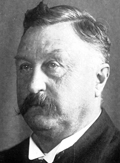 |
Konstantin Fehrenbach
b. 11 Jan 1852, Wellendingen, Baden
d. 26 Mar 1926, Freiburg im Breisgau, German Reich |
| Title: |
Reichskanzler (Reich Chancellor) |
| Term: |
21 Jun 1920 - 10 May 1921 |
| Chronology: |
21 Jun 1920,
appointed, order issued by the Reich President on 21 Jun 1920
[1] |
| |
26 Jun 1920,
took an oath of office as Reich Chancellor, Cabinet meeting [2] |
| |
4 May 1921, resignation submitted to the Reich President, accepted pending the appointment of a successor [3] |
| |
10 May 1921,
discharged, order issued by the Reich President on 10 May 1921
[4] |
| Names/titles: |
Also spelled: Constantin Fehrenbach |
| Biography: |
| Born in the family of a school teacher; attended school for boys in Freiburg im Breisgau (1865-1871); studied theology and then law in the University of Freiburg, graduating in 1879 as lawyer; member of the German Catholic student union "Hercynia"; after passing final examinations in 1882, he opened a law practice in Freiburg; joined the German Centre Party (Deutsche Zentrumspartei, commonly known as Zentrum) in 1884; deputy chairman of the Freiburg municipal council (1884-1895); was elected to the second chamber of the Ständeversammlung of the Grand-Duchy of Baden (1885-1887); resigned his seat because of differences with the party leadership in 1887; again took seat in the Ständeversammlung (1901-1913) and served as president of the second chamber (1907-1909); elected to the Reichstag (1903-1918) where represented Baden; chaired the Reichstag's budget committee (Haushaltsausschuß, 1917-1918); served as President of the Reichstag (elected and installed 8 Jun 1918, last session presided 26 Oct 1918); in response to delays in summoning a Constituent Assembly, called for resumption of the Reichstag sessions (12 Dec 1918); elected to the National Constituent Assembly (Verfassunggebende Nationalversammlung) in 1919; succeeded Eduard David as the assembly's president (14 Feb 1919 - 21 May 1920); elected to the first republican Reichstag (1920-1926); formed three-party cabinet (21 Jun 1920) composed of the members of the Centre Party, German People's Party (Deutsche Volkspartei) and Democratic Party (Deutsche Demokratische Partei); was unable to win concessions from the Allies in the matter of war reparations; headed two German delegations at the conferences in Spa and London; resigned (4 May 1921) when the Reparation Commission in Paris set the amount of reparations on 132 billion gold marks (27 Apr 1921); headed the parliamentary group of the Centre Party in the Reichstag (1923-1926). |
| Biographical sources: Reichstags-Handbuch. I. Wahlperiode. 1920. Berlin: 1920. S. 210; Reichstags-Handbuch. II. Wahlperiode. 1924. Berlin: 1924. S. 412-413; Reichstags-Handbuch. III. Wahlperiode. 1924. Berlin: 1925. S. 237. |
| |
| [1] |
Bundesarchiv, R 43 I/2936, fl. 5. |
| [2] |
Bundesarchiv, R 43 I/2936, fl. 12. |
| [3] |
Akten der Reichskanzlei: Weimarer Republik. Das Kabinett Fehrenbach (Boppard am Rhein: Boldt, 1972), S. 663-664: "Nr. 245 Tagebuchaufzeichnung des Reichsinnenministers Koch über die Kabinettssitzungen vom 4. Mai 1921, 9.45 Uhr und 17 Uhr, und über die Sitzung mit den Parteiführern um 18.30 Uhr. <...> Nach Schluß der Pause beschließt Kabinett einstimmig Rücktritt. {Footnote}: WTB meldete am 4. 5., 22.20 Uhr: „Mit Rücksicht auf die durch die Antwortnote der Vereinigten Staaten geschaffene politische Lage hat das Kabinett heute einstimmig seinen Rücktritt beschlossen. Der Reichskanzler hat sich am Abend zum Reichspräsidenten begeben, um ihm den Entschluß des Kabinetts mitzuteilen. Der Reichspräsident hat das Kabinett gebeten, die Geschäfte weiterzuführen. Das Kabinett hat zugestimmt.“ (Vorwärts Nr. 209 v. 5.5.1921)." |
| [4] |
Bundesarchiv, R 43 I/2936, fl. 33. |